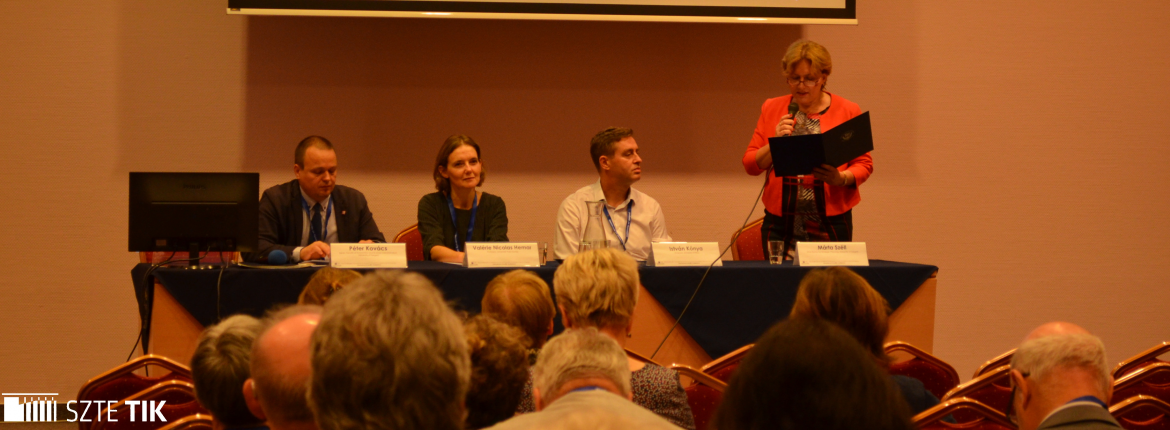Event Calendar 
-
April 13. 10:00 - 17. 14:00

To commemorate the 20th anniversary of the faculty’s founding, the University of Szeged Faculty of Economics and Business Administration organised an international conference titled The Challenges of Analyzing Social and Economic Processes in the 21st Century between 7-9 November 2019.
More than 300 participants from Hungarian and international institutions (lecturers and spectators alike) attended the 3-day conference in the József Attila Study Information Centre, organised in collaboration with the economics subcommittee of the Hungarian Academy of Sciences (MTA).
Prof. Dr. Márta Széll, the Vice-Rector for Strategic Planning delivered her opening speech on the morning of the conference’s first day, followed by the commencement of the plenary lectures. Valérie Nicolas-Hemar, an associate professor at the Université Paris Sud-Paris Saclay spoke about the challenges of economics in higher education, followed by Dr. István Kónya, a senior research fellow at the MTA Istitute of Economics whose lecture focused on the current international trends of business and economics education. In the afternoon plenary session (held in Hungarian) Prof. Dr. Ildikó Hrubos delivered her lecture titled 2020: the end of an era in European higher education. She was followed by Prof. Dr. Éva Sándorné Kriszt who spoke about the apparent gear change in Hungarian higher education. The MTA IX. Section’s Committees of Statistics and Future Research also held their scientific session on the first day of the conference.
Among the varied and colourful section lectures were speeches about the current state of economics education; financial and economic challenges on a global level; opportunities of tourism development in the Southern Great Plains region; current marketing and management trends; connections between social, economic and demographic processes; methodological issues of analysing social and economic processes; the industry 4.0 phenomenon and artificial intelligence. The special sections of the conference focused on the topics of education methodology, equal opportunities and sustainable transportation.
During the gala dinner in the evening of the conference’s first day the Dean of the Faculty, Dr. Péter Kovács delivered a the faculty’s warm gratitude to everyone who had contributed to the faculty reaching its goals in the past 20 years. He mentioned the work of the faculty’s previous Deans.
It is a source of great pride for the faculty that three scientific Committees of the MTA’s IX. section (Economics, Business Administration and Regional Studies) chose to hold a session on the second day of the conference. The chair of the session was Prof. Dr. Éva Voszka, while the main lecture of the session titled Reforming the Economics-Related Higher Education in Hungary was held by Prof. Dr. Imre Lengyel. After the comments and insights of Prof. Dr. Gyula Bakacsi, Prof. Dr. Balázs Hámori and Prof. Dr. János Rechnitzer an active discussion ensued about the current state and future of economics-related higher education in Hungary.
The participants all spoke warmly of the conference’s “joyous and friendly atmosphere and - most importantly – the exceptional, thought provoking and inspiring scientific achievements.”